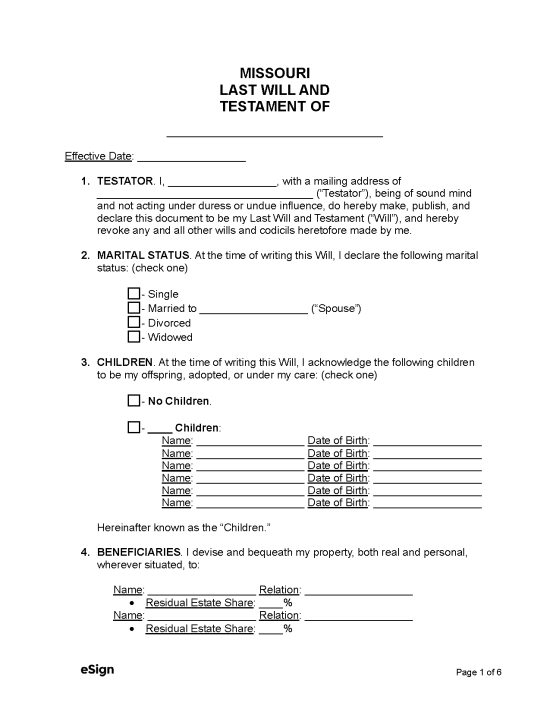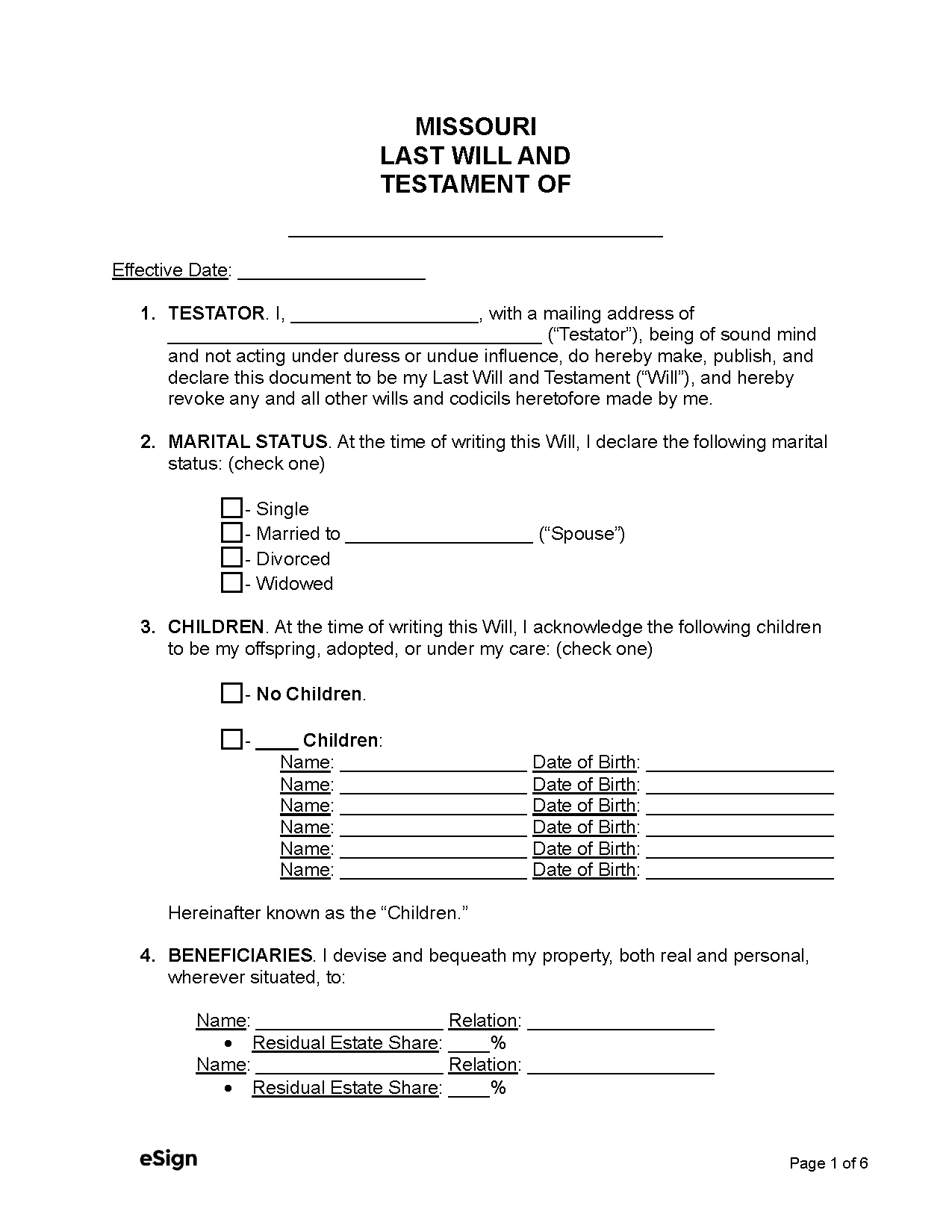A Missouri last will and testament specifies how a deceased person’s estate will be divided. By drafting a will, an individual can list their beneficiaries and appoint an executor to make sure their estate is distributed according to their wishes. A will can also include provisions such as guardianship of minor children and funeral arrangements.
In Missouri, individuals over 18 years old and emancipated minors may execute a will if they are of sound mind.[1]
State Laws
Holographic Wills – Handwritten wills must meet the same requirements as standard wills and be signed by two witnesses.[2]
Revocation – A will is revoked if destroyed or if replaced by a new will.[3]
Signing Requirements – A will is valid if signed by the testator and two competent witnesses. An interested witness may not inherit more than what they would receive if the testator had no will, unless there are two disinterested witnesses.[4]
Probate Process in Missouri (7 steps)
If the personal representative (executor) does not file the will for probate within 20 days of the date of death, any interested party may petition the court to admit the will.[5] Furthermore, if an application for probate is not filed within one year of the testator’s death, it will be barred forever from probate and the estate will pass to the heirs at law, instead of the beneficiaries.[6]
- File Petition
- Post Bond (If Applicable)
- Publish Notices
- Prepare Inventory
- Pay Debts and Taxes
- Notify Parties of Estate’s Closing
- Closing the Estate
The following is meant to be a general overview of the probate process. In Missouri, it is required that a probate attorney is hired to complete estate administration.
1. File Petition
In Missouri, wills are probated through independent or supervised administration; this guide is only for independent administration, as it’s the most common. In most cases, probate is carried out by the personal representative appointed by the testator.
Unless the personal representative is a member of the Missouri Bar, an attorney must be hired for most actions carried out in probate.[8] To begin probate, the following must be submitted online or to the court clerk of the county where the decedent last resided[9]:
- Application for Letters Testamentary – This form is used to ask for the authority to administer the estate as personal representative.[10]
- Consent to Independent Administration – This form must be filed by devisees to consent to the independent administration.[11]
- Death Certificate[12]
- Last Will and Testament – The decedent’s will must be filed with the court.[13]
- Filing Fee – All probate filings are subject to various fees.
Once the court approves the filings and admits the will into probate, they will issue a Certificate of Probate to the personal representative.[14]
2. Post Bond (If Applicable)
The personal representative must post bond before being issued Letters Testamentary unless the requirement is waived by the will or the court.[15] If applicable, a bond may be obtained via the following providers:
The bond must be signed by the personal representative and the surety, and presented to a court officer for acknowledgment.[16]
3. Publish Notices
Once the court issues the Letters of Testamentary officially appointing the personal representative, the clerk will publish a Notice of Letters and Notice to Creditors in a newspaper circulating in the county, as well as mail copies of the notices to beneficiaries.[17],[18] Publication costs must be covered by the personal representative with funds from the estate.[19] Though not required, they may also deliver a copy of the Notice to the estate’s creditors.
5. Pay Taxes and Debts
The personal representative must ensure that the estate’s taxes and debts are settled before distributing the estate. To pay unresolved taxes, the personal representative should obtain a Tax Identification Number (or “Employer Identification Number”) by filing Form SS-4 and Notice Concerning Fiduciary Relationship (IRS Form 56) with the IRS. This notice allows the personal representative to file the decedent’s final income tax return using the Individual Income Tax Return (Form 1040).
Before closing the estate, the personal representative must also submit to the Department of Social Services the Estate Notice form, indicating whether the decedent received MO Healthnet assistance during their lifetime. The Department will provide the personal representative a release showing that any funds owed have been repaid, or a waiver, which must then be filed with the court clerk.[23]
6. Notify Parties of Estate’s Closing
After six months and ten days have passed since the Letters Testamentary’s publication, the personal representative can close the estate by filing a Statement of Account. At least 29 days before filing, they must notify interested parties by publishing a Notice of Filing of Statement of Account for four weeks in a newspaper circulating in the county. The Notice, Inventory, Statement of Account, settlements, and distribution schedule must be sent to each interested party.[24]
The Notice informs that objections to the proposed distribution must be submitted within 20 days after the Statement of Account’s filing, and that the personal representative will be discharged six months after the fact. Proof of mailing the Notice and accompanying documents must also be filed with the court.
7. Closing the Estate
With the interested parties notified, the personal representative can proceed by filing the Statement of Account. If they are unable to close the estate within a year from their appointment, they must request an extension.[25] Until administration is completed, a Statement of Account must be filed annually with the court on the date the Letters Testamentary were issued.[26]
Once the Statement of Account is reviewed and the proposed distribution is approved, the estate can be distributed and the personal representative will be discharged after six months.

